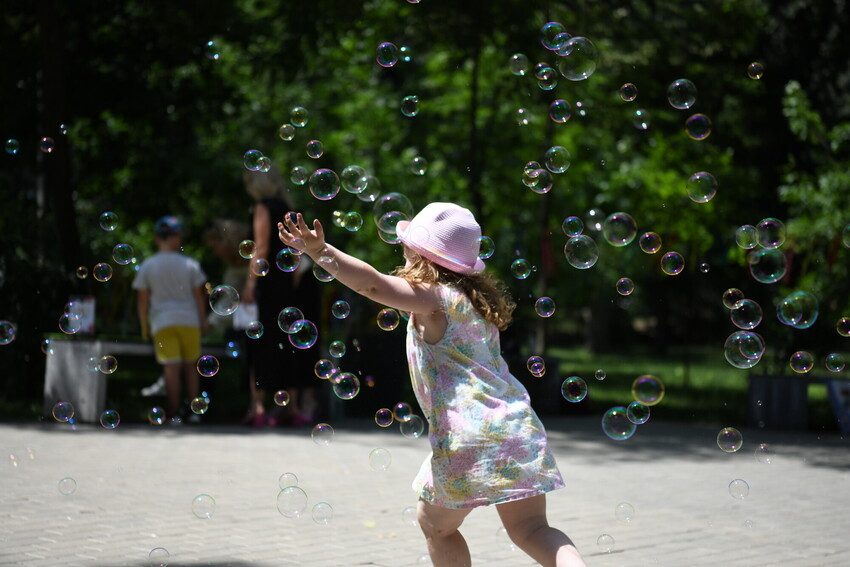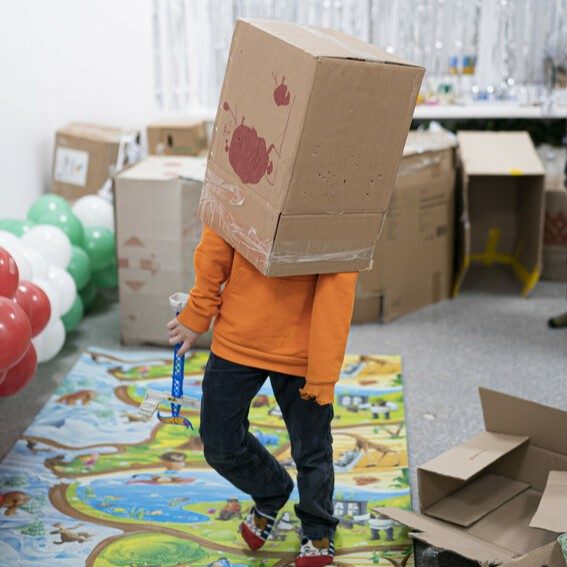Children’s wellbeing as a guiding principle for the EU’s global agenda
18 December 2024As African and European leaders gather in Luanda for the 7th AU–EU Summit, they do so at a defining moment for both continents. The world is confronting rapidly evolving crises such as protracted conflicts, democratic backsliding, growing humanitarian needs, and widening inequalities that disproportionately affect children, girls, and young people. Yet this moment also offers an unparalleled opportunity: to reimagine the AU–EU partnership as one truly rooted in rights, inclusive quality education, and equity.

To mark International Day of Play, Plan International, together with our partner Amici dei Bambini Moldova, held a fun-filled event in Chisinau, Moldova, to reaffirm that play is never just play. The event brought together over 200 children and their families, including some from Ukraine. By harnessing the power of play, Plan International programmes support Ukrainian and Moldovan children in different locations in Moldova, and involve parents and carers. They promote social cohesion, improved learning, and social and emotional well-being, creating a safe and nurturing environment in which all children can thrive. Copyright: Plan International, 2024. All rights reserved.
As 2024 draws towards its close, children across the world remain under attack. With the laws of war increasingly violated, children have become frontline targets with devastating consequences. From widespread killing, maiming, abduction and sexual violence to recruitment into armed forces and groups and strikes on schools, hospitals, essential water facilities and food supplies – children living in conflict zones around the world continue to experience violence and abuse on a shocking scale.
Shattered childhoods: the unseen impact of conflict on children
In a world where nearly 300 million people require humanitarian assistance, children often bear the heaviest burden. Conflict is pushing children in situations of extreme vulnerability. Subjected to violence and the horrors of war, they are robbed of their childhoods and too often left with deep psychological scars that can last a lifetime.
Recent research by Plan International reveals that more than half of the young people surveyed across ten countries affected by conflict experience symptoms of serious emotional distress, including sleep disturbances and constant worry. Yet, despite the scale of need, access to critical supports, including essential mental health services, remain severely limited and, in many places, completely absent.
Wellbeing as part of a holistic humanitarian approach
As Plan, we recognise the critical intersection between children’s rights, wellbeing and mental health in conflicts. Our approach to humanitarian work is holistic, ensuring that children’s basic needs – such as food, water, shelter and healthcare – are met while also addressing their wider needs and emotional wellbeing. We work with communities, partner organisations and governments to create sustainable solutions that reach children in both emergency and more stable development contexts.
A key component of Plan’s programming is child protection, working to try to ensure children are safe from harm in crises and conflicts, especially when state services collapse. Our education programmes, long supported by the EU and its member states, also play a crucial role in supporting children’s development, wellbeing and mental health. In times of crisis, access to high quality education offers a lifeline – a safe space for children to learn, grow, and heal from the trauma of war.
Play as a tool for healing
An essential aspect of Plan’s support to children in crises is our play-based approach. Play is not just an activity; it is a critical pedagogy to repair the fractures of the environment, and help children access learning and foster the breadth of skills they need to navigate a complex and uncertain world. By engaging in structured play, children regain a sense of normalcy, access emotional outlets, reestablish relationships and routines, develop critical socio-emotional skills, and boost their resilience to cope with stress and trauma.
Plan widens the net of support out to families, teachers and entire communities. One such initiative is Plan’s “Parenting Under Pressure” programme, supporting parents and caregivers by connecting them to peers in similar situations and teaching them to use play-based methods to nurture their own children’s development and mental wellbeing. This programme has been rolled out to Ukraine, Burkina Faso, Uganda, and Mali, providing critical support to families affected by crises, helping them build stronger, more supportive environments for themselves and their children.

The EU’s role as a champion for children in crises
The need for investment in the support and protection of children is critical, including in essential mental health services, with specific attention to fragile and conflict-affected areas. The trauma caused by war and displacement, combined with the lack of mental health resources, creates a vicious cycle that affects not just children, but entire communities. The EU can help put a stop to this by focusing on the following interconnected priorities.
- Sustained attention and funding
Attention is a critical currency: the EU must continue to champion children’s wellbeing and ensure that adequate funding is directed towards essential services, including mental health, for children in crisis.
- Education in Emergencies
Ensuring that education in emergencies remains a priority is essential, as it offers children a sense of stability and protection and paves the way for future learning. The EU needs to robustly fund education within emergency responses, integrating it from the onset of a crisis, across sectors and involving the entire community and to link this to the creation of longer-term sustainable education opportunities for children and young people. Education must also acknowledge the transformative power of play, which must be central in programmes, ensuring that all children have access to spaces where they can safely heal, grow and thrive.
- Localisation and sustainability
Strengthening local support systems and ensuring the sustainability of critical services, including mental health initiatives, will help ensure longer-term resilience for children, including in conflict zones. Decision-makers in the new institutional mandate must prioritise a global EU that places localisation and sustainability at its centre.
- Gender equality
Integrating gender equality objectives across programming and supports for children is always necessary, but in places where gender-based violence and inequality are high, it is literally life saving for women and girls. The EU must remain a champion in this area, driving forward ambitious and comprehensive approaches, while better ensuring compliance with existing commitments. This includes guaranteeing that at least 85% of new initiatives under its external funding mechanism – NDICI-Global Europe – have gender equality as a principal or significant objective. It must also guarantee the successful implementation of its Gender Action Plan III (GAP III) and the development of an ambitious GAP IV, as well as providing sufficient funding to address girl’s needs, including for comprehensive sexual and reproductive health services as well as mental health services.
- Accountability and monitoring
The European Parliament must use its mandate to ensure transparent monitoring of existing EU policies, such as the updated EU Guidelines on Children and Armed Conflict and hold the European Commission and member states accountable for their implementation.
- European Parliament Intergroup on Children’s Rights
Plan International is pleased to learn of the re-establishment of the European Parliament’s Children’s Rights intergroup, the cross-party, cross-national MEP group. The intergroup will play a crucial role in achieving the above objectives and must be a vocal advocate, in partnership with civil society, to ensure that children’s rights remain high on the political agenda.
The EU can help create a safer future for all children
As the world grapples with rising humanitarian crises, we must ensure that the wellbeing of children in caught in emergencies or conflicts is better protected and prioritised. Through holistic, integrated approaches that combine education, protection, and mental health supports, we can safeguard the lives and rights of children, in addition to helping them rebuild their lives and futures. This requires strong, sustained support from global leaders and institutions, particularly the EU, to create lasting positive change for the world’s most marginalised children.
The EU and its member states can help create a safer future for all children by prioritising children’s rights and needs across all their work, as well as by advocating for the respect of international law in the global arena and holding perpetrators of children’s rights violations accountable.


